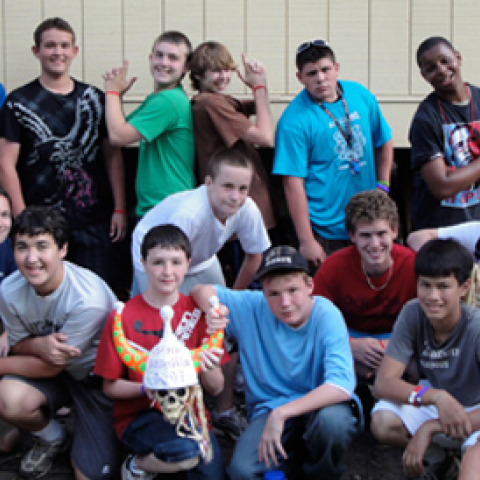Making A Difference
Jordan Smallwood, M.D. ’08 is making a difference in the lives of children affected by Type I diabetes. He volunteers his time each summer to serve campers at the ADA’s Camp Korelitz. Read his story below and find more information about Camp Korelitz here.
Every August, a campground just outside of Cincinnati is descended upon by hundreds of children with one goal in mind: to have the best week of their life while making new friends, playing games and checking their blood sugar before every meal. Camp Korelitz is a weeklong summer camp for children with diabetes, sponsored by the American Diabetes Association and staffed by local physicians, nurses, dietitians and camp staff. They have been operating for more than 30 years. For the last two years, I have volunteered as a camp physician.
As a pediatric resident and brother of a Type I diabetic, I have had the chance to see the frustrations caused by this chronic illness from both sides. I have experienced the stress of a doctor whose patients do not take insulin as directed, do not monitor their diet, or simply ignore their illness and its consequences. I have seen a patient’s anger when weight gain results from frequent insulin injections. I have witnessed the nausea, headaches and days of work missed from hyperglycemia. I have seen the tears stemming from constant feelings of failure to better manage a chronic illness you did nothing to cause.
As a camp doctor, the experience is an exhausting one in which you rarely sleep and live off of camp food and s’mores. You sing songs around campfires, pausing every once in a while to tell a camper to eat a Fruit by the Foot or to go check their urine for ketones. You wake several times at night to recheck someone’s blood glucose to make certain they are returning to normal. However, if you look beyond your duties, you will find strength of the human spirit to overcome in these campers.
Everyday at camp, I witnessed older kids teaching younger kids about their illness. They showed them how to check their blood sugar and coached them on putting in a pump site so that it was less painful. I saw new onset diabetics find the courage to insert their own pump sites or prick their finger and, for the first time, take control of their diabetes. I heard kids sing songs, make jokes, and share stories about their experience with diabetes. Most importantly, I saw kids having the time of their life because, for one week, they are not the only one giving themselves shots before every meal or stopping in the middle of activities because they feel the effects of hypoglycemia. For one week, being a diabetic makes you normal. For this non-diabetic (or ND as we are affectionately called), this was one of the more rewarding experiences of my career.
Every night, after all the campers assigned to my watch were in bed and their blood glucoses had been documented by Dr. J (apparently my ND moniker), I would return to my bunk and reflect on the day and my diabetic sister, with a newfound respect for the strength and courage that she and diabetics everywhere exhibit—a strength that we ND’s may never be able to fully grasp. But, if you are lucky, you can experience this strength, even if only for a week on a low carb campground.
